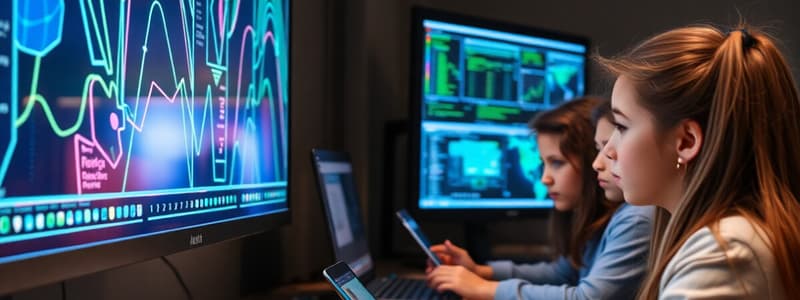Podcast
Questions and Answers
What is one of the primary uses of ICT in education?
What is one of the primary uses of ICT in education?
- Providing access to educational information (correct)
- Conducting sports competitions
- Improving school facilities
- Enhancing physical education activities
How does ICT contribute to job opportunities?
How does ICT contribute to job opportunities?
- Reduces the need for resumes
- Replaces traditional education
- Enables finding jobs through mobile phones (correct)
- Limits job options to local businesses
Which aspect of business is enhanced by ICT?
Which aspect of business is enhanced by ICT?
- Eliminating marketing needs
- Focus on manual accounting methods
- Managing personnel records and projects (correct)
- In-person meetings only
What role does ICT play in healthcare?
What role does ICT play in healthcare?
How has ICT impacted socializing?
How has ICT impacted socializing?
What is a significant benefit of ICT for government functions?
What is a significant benefit of ICT for government functions?
In which sector has ICT been one of the first to adopt technology?
In which sector has ICT been one of the first to adopt technology?
What is a function of ICT in marketing?
What is a function of ICT in marketing?
What was the primary function of Napier’s Bones?
What was the primary function of Napier’s Bones?
Which of the following was invented first among early computing devices?
Which of the following was invented first among early computing devices?
What is the purpose of the Jacquard Loom?
What is the purpose of the Jacquard Loom?
Which of the following is NOT a negative impact of information and communication technology (ICT)?
Which of the following is NOT a negative impact of information and communication technology (ICT)?
In what year was Pascaline invented?
In what year was Pascaline invented?
What was Charles Babbage known for in the context of computing?
What was Charles Babbage known for in the context of computing?
What was one of the key features of the Arithmometer?
What was one of the key features of the Arithmometer?
Which computing device was NOT primarily used for mathematical calculations?
Which computing device was NOT primarily used for mathematical calculations?
Flashcards are hidden until you start studying
Study Notes
Uses of ICT In Our Daily Lives
- ICT (Information and Communication Technology) plays a significant role in various aspects of our lives, impacting communication, job opportunities, education, and social interactions.
- Communication: ICT facilitates seamless communication through various channels, connecting individuals across geographical barriers. It also enables students to manage and monitor their learning effectively, while providing access to expert teachers and resources regardless of location.
- Job Opportunities: Organizations leverage ICT for enhanced efficiency, creating new job opportunities. Individuals can utilize mobile phones to search for employment, expanding their horizons.
- Education: Digitally literate teachers promote higher-order thinking skills in students, while schools integrate ICT tools to streamline communication, creation, dissemination, and management of information.
- Socializing: ICT fosters social connections by facilitating finding partners, accessing news, and enabling individuals to organize and demand political change.
Applications of ICT (Computers) in our Daily Lives
- Business: Computers revolutionize business operations by enabling storage and maintenance of accounts, personnel records, project management, inventory tracking, and creation of presentations and reports. They also streamline communication and promotion efforts.
- Education: Audio-visual packages, interactive exercises, and remote learning platforms enhance the learning experience. Computers provide access to a vast repository of educational information and enable the monitoring and management of student performance.
- Healthcare: Computers store and access patient data, aiding medical professionals in diagnoses and treatment. They also control lab equipment, heart rate monitors, and blood pressure monitors, contributing to improved patient care.
- Retail and Trade: Computers enable seamless purchasing and selling of products, expand market reach, and facilitate direct trading and advertising, transforming the retail landscape.
- Government: Computers streamline government operations, aiding in city planning, law enforcement, traffic management, and tourism. They facilitate information storage, service promotion, communication, and administrative tasks.
- Marketing: Computers provide data-driven insights, facilitating precise marketing strategies through analysis and manipulation of information. They power websites and promotional materials, enabling direct customer communication.
- Science: Computers were among the first to adopt computer technology, revolutionizing scientific research, information sharing, and space exploration.
- Publishing: Computers enable both hard-copy and e-book publishing, facilitate market publications, and track sales data.
- Arts and Entertainment: Computers have transformed the entertainment industry, enabling graphic design, recording, editing, and playing music, as well as gaming experiences.
- Communication: Computers have made real-time communication easier, allowing for meetings between remote participants.
- Banking and Finance: Computers empower individuals to check account balances, transfer funds, and pay off credit cards. They also streamline financial markets by facilitating stock trading, investment management, and marketing operations.
- Transport: Computers enhance safety and navigation systems in transportation, enabling features like customized seat setup and air-conditioning temperature control.
- Navigation: Integrating with GPS technology, computers facilitate easy location pinpointing, revolutionizing navigation.
- Working from home: Computers support remote working, enabling employers to monitor worker productivity from a distance.
- Military: Computers contribute significantly to military operations, aiding in training, intelligence data analysis, control of smart technology like guided missiles and drones, geospatial information and analysis, communication enhancement, and targeting enemy forces.
- Social and Romance: Computers facilitate real-time text and audio communication, power dating websites and apps, and provide platforms for blogging and online forums, shaping social interactions and romantic connections.
- Booking Vacations: Computers simplify vacation planning, enabling individuals to study timetables, examine route options, purchase tickets, book accommodations, and arrange guided tours.
- Security and Surveillance: Computers enhance security and surveillance by enabling monitoring of people and goods using face recognition technologies, automatic driver plate scanning, and sophisticated private security systems.
- Weather Forecasting: Computers process large amounts of meteorological information, enabling accurate and timely weather forecasts.
- Robotics: Computers power robots, enabling them to explore hazardous environments, assist law enforcement and military operations, and support healthcare professionals.
IMPACT OF ICT IN THE SOCIETY
- Positive Impacts:*
- Access to information: ICT empowers individuals with access to a vast repository of information, expanding knowledge and understanding.
- Improved access to education: ICT provides new avenues for education, including distance learning opportunities, reaching areas with limited access.
- New tools, new opportunities: ICT introduces new tools and opportunities, fostering innovation and economic growth.
- Communication: ICT strengthens communication, fostering global connections and collaboration.
- Security: ICT aids in establishing robust security systems, protecting individuals and property from threats.
- Participate in a wider society: ICT empowers individuals to participate in a wider social and political landscape.
- Distance learning: ICT facilitates distance learning, expanding access to educational opportunities.
- Perform impossible experiments through simulations: ICT enables scientists to perform complex experiments through simulations.
- Creation of more interesting jobs: ICT creates exciting and challenging job opportunities in diverse fields.
- Negative Impacts:*
- Job loss: ICT automation can lead to job displacement in certain sectors.
- Reduced personal interaction: Excessive reliance on technology can diminish face-to-face interactions.
- Reduced physical activity: Sedentary lifestyles associated with technology can contribute to health issues.
- Cost: Accessing and maintaining ICT resources can be expensive.
- Competition: ICT advancements can lead to increased competition in the job market.
History of Computer: Basic Computing Periods
- Computers have evolved significantly throughout history, with each period marking a significant advancement.
- Tally Sticks: These ancient memory aids were used for recording numbers, quantities, and messages, laying the foundation for data storage.
- Abacus: The abacus, invented in Babylonia around 2400 BC, is a mechanical device for performing mathematical equations. The form we are familiar with originated in China around 500 BC.
- Napier's Bones: Invented by John Napier in 1614, Napier's Bones were rods used for multiplication, division, finding square roots, and cube roots.
- Slide Rule: Introduced by William Oughtred in 1622, the slide rule is a tool for performing multiplication, division, logarithms, and trigonometry.
- Pascaline: Created by French mathematician Blaise Pascal in 1642, the Pascaline was a mechanical calculator.
- Stepped Reckoner: Invented by Gottfried Wilhelm Leibniz in 1672, the stepped reckoner could automatically add, subtract, divide, and multiply.
- Jacquard Loom: Developed by Joseph-Marie Jacquard in 1881, the Jacquard Loom was a mechanical loom controlled by punched cards, leading to the concept of programmable machines.
- Arithmometer: Invented by Thomas de Colmar in 1820, the arithmometer was the first commercially successful calculating machine and the first to be mass-produced.
- Difference Engine: Designed by Charles Babbage, considered the "Father of Computers," the Difference Engine was capable of calculating results with up to 20 decimal places.
Studying That Suits You
Use AI to generate personalized quizzes and flashcards to suit your learning preferences.




